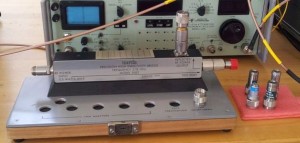Attenuation is defined as insertion loss minus reflection loss.
The insertion loss measurements – that’s quite straightforward, with signal genarator and receiver. We will deal with the particulars later.
For the reflection loss, we still need another device, a directional device. Either a directional coupler, or a return loss bridge.
After careful review, I selected a Narda 5082 “Precision high directivity bridge”. Several reasons:
(1) It is a fairly robust device, and offers N and APC-7 connectors. Luckily, APC-7 adaptors were included. Also included was a combined short/open, APC-7 style. That’s really great.
(2) It is very broadband, 2-18 Ghz full range with one device. This eliminates connections – there are hardly and couplers available that offer 35+ dB directivity, over the full band.
(3) The bridge has a bit more insertion loss compared to a coupler/multi-coupler solution, about 6 dB, but the loss is well defined and flat, will be calibrated out.
(4) It was available, at a few cents for the list price in dollars, and in pristine condition.
Next step: need to connect the “reflected” port to a switch matrix, via an APC-7 to SMA adapter (which I don’t have in my collection).

